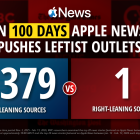Facebook stood up for free speech against former Vice President Joe Biden’s campaign’s petition calling for censorship.
The Biden campaign posted an open letter to Facebook demanding the platform change its policies on free speech. The letter urged the Big Tech company to “use its platform to improve American democracy rather than as a tool to spread disinformation that undermines our elections.” The Biden campaign also suggested that President Donald Trump and his allies have used social media “to spread fear and misleading information about voting.”
Facebook responded to the Biden campaign in a June 11 press release, suggesting that the platform would not censor political speech:

“We live in a democracy, where the elected officials decide the rules around campaigns. Two weeks ago the President of the United States issued an executive order directing Federal agencies to prevent social media sites from engaging in activities like fact-checking political statements. This week, the Democratic candidate for President started a petition calling on us to do the exact opposite. Just as they have done with broadcast networks — where the US government prohibits rejecting politicians’ campaign ads — the people’s elected representatives should set the rules, and we will follow them. There is an election coming in November and we will protect political speech, even when we strongly disagree with it.”
Trump had sparked a firestorm of controversy after he voiced concern about mail-in ballots. Twitter responded by labeling Trump’s tweet with an interstitial, implying that his concerns about mail-in ballots leading to voter fraud were “misleading.”.
Facebook, however, took a different tack. Instead of censoring Trump, Zuckerberg’s social media platform initially stood its ground, allowing the president’s comments to remain on the platform. Zuckerberg explained that while he did not like the president’s fiery rhetoric, free speech is his utmost priority. “Personally, I have a visceral negative reaction to this kind of divisive and inflammatory rhetoric,” he said in a lengthy post about Trump’s comments. “But I’m responsible for reacting not just in my personal capacity but as the leader of an institution committed to free expression.”
Upon receiving further backlash, Zuckerberg backpedalled, suggesting Facebook would reevaluate its policies and consider censoring Trump. In doing so, he acknowledged previous backlash over his stances and stated, “We’re going to review our policies allowing discussion and threats of state use of force to see if there are any amendments we should adopt.”
But this recent response from Facebook seems to suggest the platform may be hearkening back to defending more of a free speech stance.









